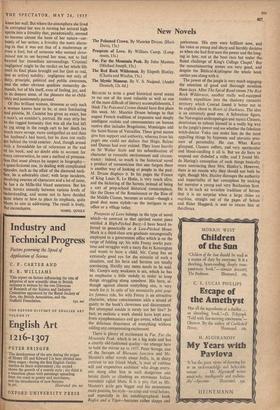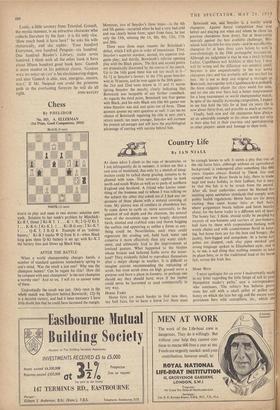New Novels
Far, Far the Mountain Peak. By John Masters. (Michael Joseph, 15s.) The Red Rock Wilderness. By Elspeth Huxley. (Chatto and Windus, 15s.)
BECAUSE to write a good historical novel seems to me one of the most valuable as well as one of the most difficult of literary accomplishments, I think The Poisoned Crown should have first place this week. Mr. Maurice Druon belongs to that august French tradition of impassive and deeply intelligent realists and commentators on human motive that includes Bragelonne, Montaigne and the Saint-Simon of Versailles. These great names give him support and authority, whereas from his pages one could not deduce that Hugo, Balzac and Dumas had ever existed. They leant heavily on Sir Walter Scott and his subordination of character to romantic environment and circum- stance : indeed, so much is the historical novel a product of romanticism that one forgets there is another way of looking at people in the past. M. Druon displays it. In his pages the France of King Louis X, Le Hutin, is very much alive, and the bickering of the barons, instead of being a sort of prep-school historical commonplace, like the Dawn of the Renaissance or the Rise of the Middle Classes, becomes as actual—though a good deal more stylish—as the intrigues in an office or a village today.
Prospects of Love belongs to the type of novel which—in contrast to that spirited recent piece entitled A High-Pitched Buzz—I have heard re- ferred to generically as A Low-Pitched Moan. Mark is a third-class arts graduate uncongenially employed in a government office which is on the verge of folding up; his wife Fenny works part- time and struggles with a nasty flat in Kensington and wants to have a child. Mr. Camp has an extremely good eye for the minutiae of such a situation, and his hero and heroine are totally convincing. Hardly any more needs to be said. Mr. Camp's only weakness is sex, which he has to emphasise a little unduly in order to keep things struggling along somehow. His hero, al- though against almost everything else, is very much for it. In spite of her necessarily pitie pour les femmes role, his wife Fenny is an attractive character, whose consciousness adds a strand of gaiety to the book's cleverness and discernment. But attempted suicide is surely not her line? In fact, so realistic a work should have kept away from nymphomaniacs and gas ovens, which spoil the delicious dreariness of everything without adding any compensating excitement.
There• is plenty of excitement in Far, Far the Mountain Peak, which is on a big scale and has a courtly old-fashioned quality—no attempt here to hold the mirror up to 1957. Peter Savage, one of the Savages of Bhowani Junction and Mr. Masters's other novels about India, is, in sharp contrast to our friend Mark, 'a man of ruthless will and stupendous ambition' who drags every- one along after him in such dangerous and heroic deeds as climbing an enormous Indian mountain called Mcru. It is a pity that as Mr. Masters's scale gets bigger and his seriousness more positive, his style—so crisp and vivid before, and especially in his autobiographical book Bugles and a Tiger—becomes rather sloppy and
portentous. 'His eyes were brilliant now, and his voice as young and sharp and harshly decisive as when she had first seen the power and the long- ing in him, not at the boat race but under the fluted challenge of King's College Chapel.' But the mountaineering scenes are very good, and despite the Biblical-Kiplingese the whole book carries you along with it.
The power of the jungle is very much engaging the attention of good and thorough novelists these days. After The Spiral Road comes The Red Rock Wilderness, another really well-equipped modern expedition into the shadowy romantic territory which Conrad found it better not to be explicit about in Heart of Darkness. The idea is an extremely good one. A Schweitzer figure, the Norwegian anthropologist and mystic Clausen, determines to submit himself in a really big way to the jungle's power and see whether the fabulous witch-doctor Vuko can make him do the most appalling things by hypnosis and atavistic pres- sure of personality. He can. What Kurtz glimpsed, Clausen suffers, and very spectacular and blood-curdling it all is. But we do have to suspend our disbelief a trifle; and I found Mr. de Hartog's conception of such things basically more convincing than Mrs. Huxley's. However, there is no reason why they should not both be right, though Mrs. Huxley damages the authority and impartiality of her conception by making her narrator a young and very Buchanian Scot. He is in such an inviolate tradition of heroes that it is no surprise when a large rhino ex machina. straight out of the pages of Selous and Rider Haggard, is sent to rescue him at the climax. Lastly, a little savoury from Trinidad. Ganesh, the mystic masseur, is an attractive character who collects literature by the foot : it is his only vice. 'How much book it have here?' he asks his wife rhetorically, and she replies : 'Four hundred Everyman, two hundred Penguin—six hundred. One hundred Reader's Library, make seven hundred. I think with all the other book it have about fifteen hundred good book here.' Ganesh is more modest in his political claims. `GANESH WILL DO WHAT HE CAN' is his electioneering slogan, and also `Ganesh is able, nice, energetic, sincere, HOLY.' If Mr. Naipaul can avoid the primrose path to the everlasting Saroyan he will do all































 Previous page
Previous page